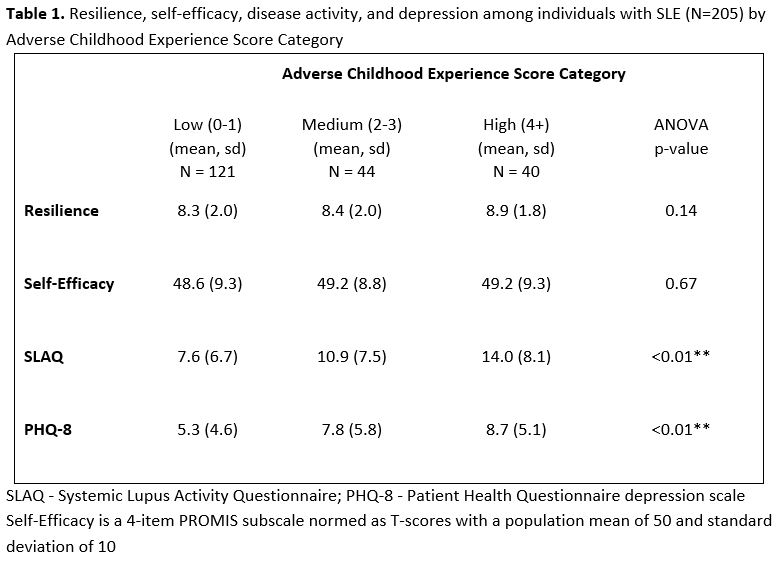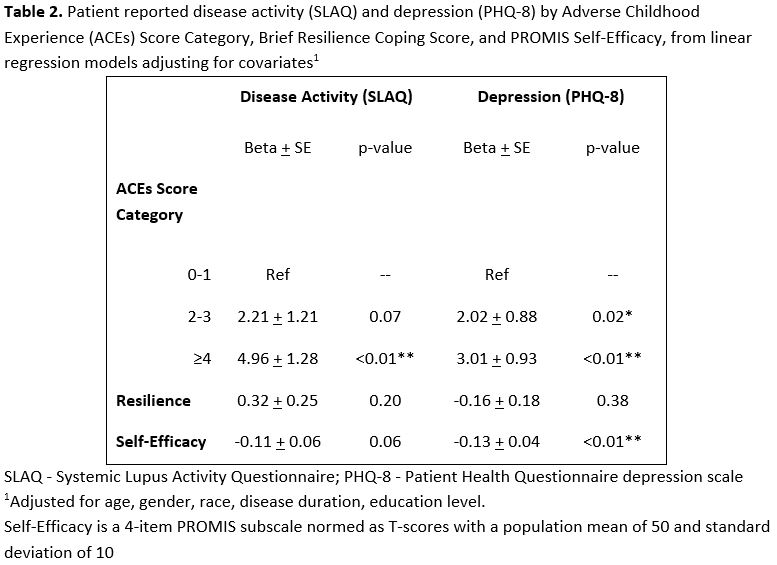Session Information
Date: Sunday, November 7, 2021
Title: Patient Outcomes, Preferences, & Attitudes Poster II: Measurements (0739–0763)
Session Type: Poster Session B
Session Time: 8:30AM-10:30AM
Background/Purpose: Modifiable adaptations to adversity such as resilience (the ability to recover from difficulty) and self-efficacy (the belief in one’s ability to succeed in a situation) may be protective for those with SLE who experience stress. We previously reported that patients with a history of adverse childhood experiences (ACEs) demonstrate worse patient-reported outcomes. There are gaps in how to ameliorate poor outcomes among patients who experienced ACEs. We seek to identify patterns of adaptations to adversity as potential targets for future interventions in this population.
Methods: Data are from the California Lupus Epidemiology Study (CLUES), a diverse sample of adult SLE patients with confirmed diagnosis of SLE (met (a) ≥4/11 ACR 1982/1997 criteria for the classification of SLE, (b) 3/11 ACR 1982/1997 criteria and treating rheumatologist’s diagnosis of SLE, or (c) diagnosis of SLE nephritis). Participants completed a 10-item ACE questionnaire (range 0-10), a 4-item Brief Resilience Coping Score (BRCS, range 0-12), and the PROMIS self-efficacy survey. We examined associations for patient-reported measures of disease activity (SLAQ) and depression (PHQ-8) as well as ACEs with BRCS and self-efficacy using ANOVA and linear regression, controlling for age, gender, race/ethnicity, education, and disease duration. We also tested for interactions between ACE scores and resilience/self-efficacy.
Results: Of the 205 participants, 91.7% were female and 69.3% were non-white, with a mean ACE score of 1.76 (SD 2.1). Resilience was at the middle of the scale range (mean 8.4, SD 2.0) and the self-efficacy PROMIS measure was near the mean for the population distribution (mean 49.0, SD 9.1). There were similar levels of resilience and self-efficacy across ACE score categories (Table 1). As depicted (Table 2), there were significantly worse SLAQ and PHQ scores for people with higher ACE scores compared to people in the low ACE score category (0-1). Resilience showed no significant independent effect on SLAQ or PHQ, but self-efficacy was associated with better PHQ scores and SLAQ scores, although the latter did not reach statistical significance. Interactions between ACE score and resilience/self-efficacy were not statistically significant.
Conclusion: Individuals with SLE with the highest ACEs exposures reported high disease activity and depression. Resilience did not show protective effects on the outcomes examined in this cohort. However, self-efficacy, for which interventions have been developed, was associated with less depression, suggesting the potential for interventions targeting self-efficacy to improve outcomes. Experiencing ACEs did not affect whether a participant was more or less resilient or self-efficacious. Additional targets for interventions, such as social support, merit exploration to better bolster SLE patients with a history of ACEs.
To cite this abstract in AMA style:
DeQuattro K, Seet A, Trupin L, Rush S, Barbour K, Dall'Era M, Yazdany J, Katz P. Intervening on Adverse Childhood Experiences in SLE—Self-Efficacy as a Potential Target [abstract]. Arthritis Rheumatol. 2021; 73 (suppl 9). https://acrabstracts.org/abstract/intervening-on-adverse-childhood-experiences-in-sle-self-efficacy-as-a-potential-target/. Accessed .« Back to ACR Convergence 2021
ACR Meeting Abstracts - https://acrabstracts.org/abstract/intervening-on-adverse-childhood-experiences-in-sle-self-efficacy-as-a-potential-target/


